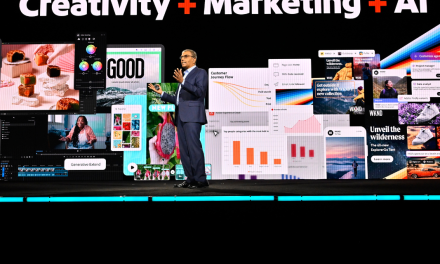Should we fear generative AI upending the marketing function? If not, how should marketers harness it to revolutionize their strategies?
Generative AI has captured interest across the Asia Pacific and proven that the buzz is far from mere hype. But with most of the discussion centred around productivity, many overlook the full promise of generative AI to drive marketing strategies.
Simply put, cutting-edge marketing relies on a combination of data insights and creativity. This is where generative AI can supplement human ingenuity with its unparalleled access to a trove of content and data insights.
Organisations in Asia Pacific are already primed to push the envelope when it comes to generative AI use cases. According to a survey by IDC, 38% of businesses in the region are actively exploring the potential applications for generative AI. With modern marketing’s reliance on a combination of data-driven insights and creativity, generative AI’s ability to supplement human ingenuity by providing access to a wealth of content and data insights can be ground-breaking.
It is important to note that AI will not upend the marketing industry. Instead, generative AI will augment and enhance the work of marketing professionals. One significant way it will do this is by empowering predictive analytics. Sales and marketing teams achieve the best results when they collaborate closely.
With multiple human touchpoints throughout the sales cycle and customer journey, a significant amount of data is generated. AI and machine learning (ML) can derive valuable insights from this data, allowing marketing professionals to predict the future state of their sales pipelines accurately. This empowers them to make precise adjustments to their marketing investments as needed.
The power of AI in marketing
Generative AI can make a difference here by accelerating the development of predictive analytics initiatives through faster code generation and expediting the entire lifecycle. And its impact extends far beyond predictive analytics. Generative AI applications powered by proprietary data allow marketing teams to minimise time spent on repetitive tasks and instead focus on more impactful activities.
For instance, a simple generative AI tool can swiftly compile lists of potential leads within seconds, replacing hours spent manually doing this.
In addition, generative AI drives innovation by streamlining the creative process. Marketing teams thrive when ideas are refined collaboratively. Generative AI contributes to this process by generating more ideas during the feedback loop, enhancing and expediting the creative process.

For example, a generative AI tool can swiftly produce captivating headlines and visually appealing designs that free up marketers to focus on more pressing tasks. In fact, 74% of respondents in a World Federation of Advertising survey report that they already utilise generative AI for content creation.
Furthermore, with the sheer volume of data marketing teams generate, being able to interpret thousands of pages of information rapidly is crucial. However, humans simply cannot do this.
On the other hand, as an IDC report shows, generative AI thoroughly enhances knowledge management – and is having a significant impact across the Asia Pacific in this regard. Not only that, but well-trained generative AI tools can also help marketers develop highly customised marketing content as well as search-engine-optimised content.
Through its ability to pore over an abundance of unstructured and semi-structured data instantly, generative AI can effectively develop tailored social media posts, landing pages, as well as emails.
Laying the foundation for generative AI
The potential of combining generative AI with human creativity is vast and use cases so far are just the tip of the iceberg. By using advanced deep learning techniques, generative AI models break new ground as they can generate entirely new outputs rather than simply predict outcomes based on prior experience. This shift from prediction to creation opens exciting possibilities for innovation, but organisations need to have the foundations in place if they are to get anywhere with generative AI.
One critical aspect to consider is data availability. Contextualisation, a key advantage of generative AI and large language models (LLMs), relies on comprehensive data. However, many enterprises still have data scattered across isolated silos in legacy, on-premises systems. To leverage generative AI effectively in marketing, organisations should utilise cloud data platforms to consolidate and unify their internal data.
In addition to breaking down data silos, businesses must ensure seamless access to all types of their vast volumes of data – a cloud data platform that efficiently loads, integrates, and analyses data of various formats. In practical terms, this could enable users to ask direct questions that a LLM then uses to quickly analyse an application’s underlying data model and precisely pinpoint the right data asset or data insight.
Lastly, marketers should collaborate with cross-functional teams comprising data scientists, legal professionals, and security experts to proactively address data governance and security concerns. Establishing necessary guidelines and guardrails is essential. Moreover, ensuring the infrastructure meets the requirements for safeguarding sensitive data, such as personally identifiable information (PII) and internal documents, is crucial for maintaining data security.
A new age in marketing
Generative AI presents numerous advantages for enhancing marketing strategies, including improved predictive analytics, faster processes, increased creativity, and enhanced personalisation. This technology is already making a significant impact in software and enterprises, but there is still much potential to be explored.
Nothing encapsulates this potential better than the fact that generative AI fundamentally transforms how businesses interact with data. With generative AI, marketing teams can discover precisely the right data point, data asset, or data insight to maximise the value of their data. The caveat though is that organisations need a robust data infrastructure. This involves breaking down data silos, ensuring seamless access to all types of data, and proactively addressing data governance and security concerns – only then can human ingenuity and generative AI jointly take marketing strategies to new heights.


















